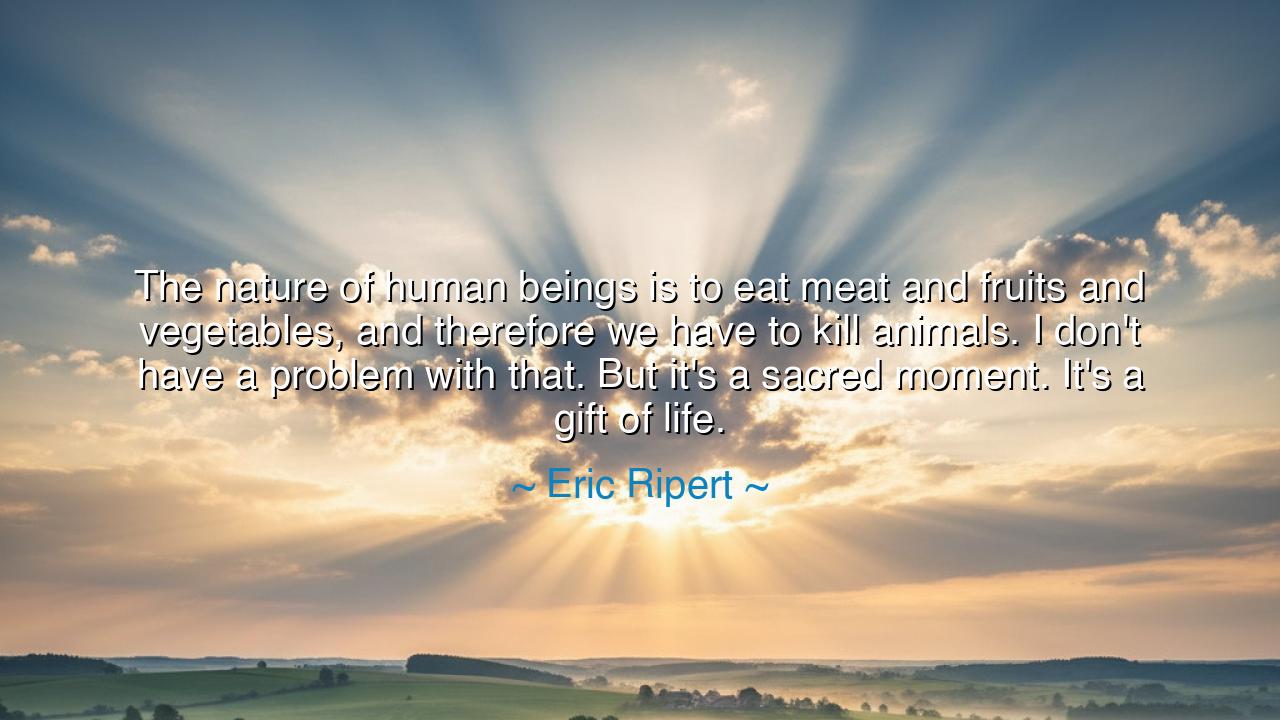
The nature of human beings is to eat meat and fruits and
The nature of human beings is to eat meat and fruits and vegetables, and therefore we have to kill animals. I don't have a problem with that. But it's a sacred moment. It's a gift of life.






In the words of Eric Ripert, there is a profound meditation upon human nature, sustenance, and reverence: “The nature of human beings is to eat meat and fruits and vegetables, and therefore we have to kill animals. I don't have a problem with that. But it's a sacred moment. It's a gift of life.” He acknowledges a truth as old as humankind—that to live is to take life, whether from plant or beast. Yet what gives his words weight is not the acceptance of necessity, but the recognition that each act of nourishment is also an act of sacrifice, demanding humility and gratitude.
The origin of this truth lies deep in the traditions of every culture. In ancient tribes, the hunter who struck down a deer would often kneel, offering thanks to the spirit of the animal. Native peoples of North America prayed over the buffalo, seeing in its flesh, hide, and bones not only sustenance but a sacred exchange. In Japan, the phrase itadakimasu—spoken before meals—means not merely “I receive,” but “I humbly accept the lives that have been given.” Ripert stands within this lineage of respect, reminding us that eating is not only survival, but participation in the great cycle of life and death.
There is a deep emotional weight in the phrase “a sacred moment.” In modern times, food is too often stripped of its meaning—plastic-wrapped, processed, divorced from the reality of what it once was. Yet to those who pause and consider, each bite carries a story: the life of the animal, the growth of the plant, the toil of the farmer, the patience of the earth. By calling this exchange sacred, Ripert restores dignity to the act, transforming the ordinary into a moment of reverence.
History provides vivid reminders of what happens when this respect is forgotten. When animals are treated as mere machines of flesh, or when the land is stripped without care, the balance of nature rebels—diseases spread, soil is depleted, and the chain of life weakens. By contrast, the Maori of New Zealand offered prayers before fishing or hunting, believing the ocean itself must be honored. Their survival was not merely physical—it was spiritual, rooted in respect for the gift of life.
The wisdom here is also heroic in its honesty: Ripert does not deny that killing is involved. Too often, people prefer to look away, to shield themselves from the truth of their own survival. But he teaches us to face it directly: we must kill, yes, but let it not be done in blindness or cruelty. Let it be done with consciousness, gratitude, and restraint. For in acknowledging the cost of our nourishment, we remain human, not beasts of greed.
From this teaching arises a lesson: live with gratitude. Do not eat thoughtlessly, but remember that each meal is the culmination of sacrifice. Before you eat, pause—even if only for a breath—and give thanks. In doing so, you elevate eating from habit to ritual, from consumption to communion. Teach your children that food is not cheap, but precious, for it carries within it the life of another being.
Practically, this means to waste nothing, to choose food wisely, to support practices that honor the land and the creatures upon it. To eat is not only to feed the body, but to participate in a covenant with the earth: take only what you need, honor what you take, and give back where you can. Plant trees, tend gardens, support farmers who treat their animals well. In these acts, you acknowledge the sacred exchange that sustains you.
Thus, when Ripert calls food a gift of life, he is not speaking lightly. He is urging us to remember that life feeds upon life, and that the only way to honor such a cycle is with reverence. Carry this wisdom with you, O listener, and let every meal remind you of your place in the grand tapestry of existence: fragile, dependent, and bound by gratitude to all that gives itself so you may live.






AAdministratorAdministrator
Welcome, honored guests. Please leave a comment, we will respond soon